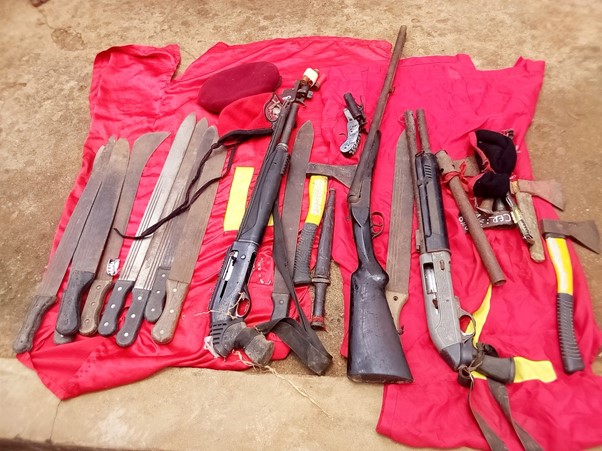Parental Failure, New Media Responsible For Underage Cultism – Experts

The menace of cults is gradually finding its roots in homes as membership is no longer a preserve of youth in tertiary institutions and adults in Nigeria but adolescents most of who are below the legal age of 18 are also involved.
HumAngle’s interactions with some young cultists who are members of different groups in Awka, Anambra State, Southeast Nigeria, revealed that peer pressure in the neighborhood and secondary schools was the major reason for their involvement in the crime.
Most of them said they were forced into the groups without their consent but none reported their predicaments to their parents from the point of intimidation to initiation, neither did their parents notice until they were arrested by the security agencies.
Chukwudi Okoye, a 21-year-old man, who was arrested by personnel of Special Anti Cult Squad in Oba, Anambra State, said he was initiated into “Apache” cult group when he visited his elder brother in Aba, Abia State. He said that at the time, he was in Senior Secondary class 1.
Okoye said he was accosted and intimidated by a gang of boys who later forced him to become their member by performing some initiation rites.
“They beat me up and forced me to join. They warned that if I told anybody they would come after my life, that was why I did not tell my parents,” he said.
Kelechi Olisa, a 20 year-old, said he joined a cult group in 2014 when a particular boy who was a member of Aiye group in his street stopped him from fetching water.
Olisa said he decided to join ‘ Apache’, a rival group in his neighborhood, to enjoy some protection but he later found himself attending nocturnal meetings and engaging in crimes and other social vices.
He said although the friend who introduced him to cultism had died in an armed robbery attack, he had not been able to extricate himself from cult activities but rather had gone into touting and sale of revenue tickets to earn a living.
“The friend that took me to the cult group has died but the rule is that if I leave they will kill me.
“Am actually disappointed in myself because since all these years I have been in cultism, there is no good benefit that I have enjoyed,” he said.
Ebube, a 17-year-old carpenter, said he was recruited into Junior Vikings Confraternity in secondary school by fellow students when he was 14.
Ebube said he kept the secret from his parents such that they did not believe that he was a cult member.
There was also a student in his early teens who took his father’s gun to school to prove to his new friends in cultism that he was a strong boy.
“My friend told me to accompany him to a place and when we got there some of his friends emerged, that was when I realised that they were cultists and I was forcibly initiated that day, “ he said.
A major source of concern to many is how these young adults get into cultism with all the trauma and sometimes injuries and stay in the same home with their family members without being identified as cultists.

But Prof. Michael Ezenwa, a clinical psychologist, said the high involvement of adolescents in cultism was because of a breakdown of family relationships, parental failure and influence of new media.
Ezenwa, who is the President of Nigeria Psychological Association, said the lack of attention in the family had driven children to seek solace and security in the wrong places.
He said parents, especially, had abandoned the family in search of money and political power with the wrong assumption that all they owed their children were food and school fees.
He called on parents to give more attention and affection to their children so that the child could see his or her family as the best place to confide in people and find security.
According to him, child cultism is one of the challenges of the society today.
“I blame it on breakdown in family relationships and parental failure to monitor their wards. In the past, the family had a critical role in terms of making the child feel belonged.
“The family is supposed to provide the child with security, love and attention but now the mother now chases merchandise, political power and other things instead of family life and nurturing of children.
“As a result, children of these days cling to the media, particularly the new media – WhatsApp, Instagram and Facebook – and they meet with other children without having the supervision that parents ought to provide.
“It not only lures them into cultism but other vices like illicit sex, early exposure to sexual activities and drugs.
“Parents don’t discover this because they don’t have the time, they think it is just food and school fees without knowing if the children are in school during school period.
“The thinking is that getting involved in cultism is a sign of identification and security not knowing that it is associating with death and darkness and withdrawing from it becomes difficult.
“Any parent that looks at the child on a daily basis, that supervises the child’s school activities, social behaviour, will immediately discover when that child starts having some form of engagement that is unusual and nip it in the bud,” Ezenwa said.
The Commissioner of Police in Anambra State, Mr John Abang, blamed the involvement of young people in cultism on the cold relationship between the parents and their children.
Abang said many parents had abdicated their roles and become distant from their children or wards such that they did not know their behaviours or the kind of friends they kept.
He said stronger bonding in the family would engender trust and confidence which would help in early detection of any abnormal development in the child.
“For me, I blame the parents for the loss of our societal values, they don’t ask questions even when they see strange behaviours in their children or wards.
“How can a teenager go to school with a gun, who was in the house when he was leaving?
“It is because most of our parents have failed in their duties that the command under my watch is now partnering civil society organisations, traditional institutions and government on moral reorientation of the child.
“So, while we are tackling the menace of cultism frontally, we are also working on the moral values of the youths,” Abang said.
Support Our Journalism
There are millions of ordinary people affected by conflict in Africa whose stories are missing in the mainstream media. HumAngle is determined to tell those challenging and under-reported stories, hoping that the people impacted by these conflicts will find the safety and security they deserve.
To ensure that we continue to provide public service coverage, we have a small favour to ask you. We want you to be part of our journalistic endeavour by contributing a token to us.
Your donation will further promote a robust, free, and independent media.
Donate HereStay Closer To The Stories That Matter




